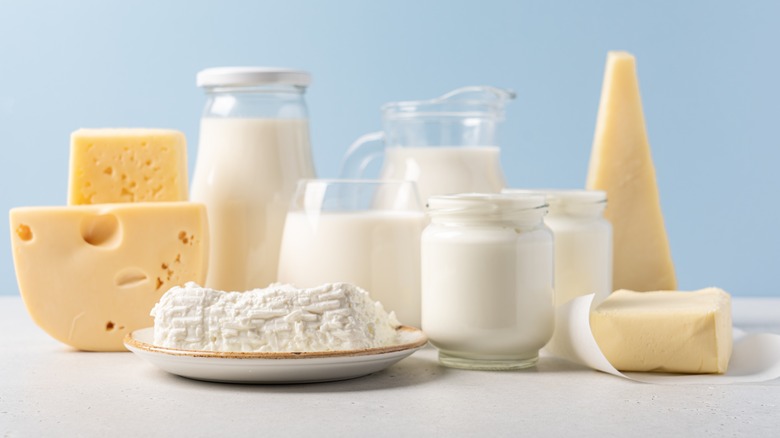Avoid Eating This If You're Constipated
If you suffer from constipation, you're likely having a bowel movement fewer than three out of seven days of the week, according to the Mayo Clinic. When you do feel the need to pass one, you also may find it difficult to do so and spend an excessive amount of time straining and pushing to evacuate your bowels. The bowel movements in question also tend to be small and hard, rather than fully formed and soft.
In fact, the experts at the Cleveland Clinic note that constipation affects around 2.5 million Americans on a yearly basis (at least as far as those that report the condition to their doctor) and adds that there are many causes behind it. Often times constipation is linked to diet. For example, a diet low in fiber, which is important for bulking up stools, can lead to constipation. Additionally, not hydrating enough with water throughout the day can cause the condition. Therefore, Healthline points out that you should aim for about half a gallon of water on a daily basis to keep all systems running smoothly. Other factors that contribute to constipation are stress, a lack of regular exercise, certain medications, and health conditions, such as pregnancy and irritable bowel syndrome (IBS).
Luckily, there are ways to both treat and avoid constipation, many of which start with diet, explains Medical News Today. With that being said, to alleviate symptoms, you may want to try eliminating dairy.
Dairy can contribute to constipation
For those that have a sensitivity or intolerance to lactose, eating dairy products can lead to constipation, explains Medical News Today. This has mostly been studied in children, and in one 2008 systematic review published in Nutrition & Dietetics, researchers found evidence that children who cut out cow's milk protein from their diet noticed improved constipation symptoms. In a 2013 study, which once again examined the connection between cow's milk and constipation in children, found that replacing dairy milk with soy milk led to an increase in the number of weekly bowel movements in one of the trials. Finally, one more recent 2021 study published in the Caspian Journal of Internal Medicine looked at the effect of eliminating cow's milk from the diets of children who did not respond to laxatives and found that over 70% of the participants responded favorably to the treatment.
Another reason dairy may cause constipation is due to its high levels of calcium. After all, UCSF Health specifies that one cup of low-fat dairy milk contains 300 milligrams of the mineral, which is roughly a third of the daily requirements for adults aged 19 to 50. The experts at Mayo Clinic explain that excess calcium can lead to constipation as a side effect.
In addition to eliminating dairy from your diet to see if it may be the culprit behind your constipation, Medical News Today also recommends eating prunes, taking probiotic supplements, and incorporating more exercise into your daily routine.


